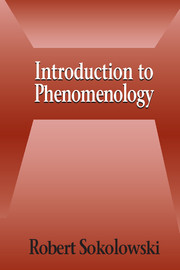Book contents
- Frontmatter
- Contents
- Acknowledgments
- Introduction
- 1 What Is Intentionality, and Why Is It Important?
- 2 Perception of a Cube as a Paradigm of Conscious Experience
- 3 Three Formal Structures in Phenomenology
- 4 An Initial Statement of What Phenomenology Is
- 5 Perception, Memory, and Imagination
- 6 Words, Pictures, and Symbols
- 7 Categorial Intentions and Objects
- 8 Phenomenology of the Self
- 9 Temporality
- 10 The Life World and Intersubjectivity
- 11 Reason, Truth, and Evidence
- 12 Eidetic Intuition
- 13 Phenomenology Defined
- 14 Phenomenology in the Present Historical Context
- Appendix: Phenomenology in the Last One Hundred Years
- Select Bibliography
- Index
8 - Phenomenology of the Self
Published online by Cambridge University Press: 05 June 2012
- Frontmatter
- Contents
- Acknowledgments
- Introduction
- 1 What Is Intentionality, and Why Is It Important?
- 2 Perception of a Cube as a Paradigm of Conscious Experience
- 3 Three Formal Structures in Phenomenology
- 4 An Initial Statement of What Phenomenology Is
- 5 Perception, Memory, and Imagination
- 6 Words, Pictures, and Symbols
- 7 Categorial Intentions and Objects
- 8 Phenomenology of the Self
- 9 Temporality
- 10 The Life World and Intersubjectivity
- 11 Reason, Truth, and Evidence
- 12 Eidetic Intuition
- 13 Phenomenology Defined
- 14 Phenomenology in the Present Historical Context
- Appendix: Phenomenology in the Last One Hundred Years
- Select Bibliography
- Index
Summary
The things we experience present themselves as identities within manifolds of appearance. Our own self, our “ego,” also establishes and presents itself to us as an identity in a manifold of appearances, but the manifold in which we are presented to ourselves is different from those in which things are presented. We never show up to ourselves in the world as just one more thing; we stand out, each of us, as central, as the agents of our intentional life, as the one who has the world and the things in it given to him. Our power of disclosure, our being the dative of manifestation for things that appear, introduces us into the life of reason and the human way of being.
THE EMPIRICAL AND THE TRANSCENDENTAL EGO
There is a marvelous ambiguity to the ego: on the one hand, it is an ordinary part of the world, one of the many things that inhabit it. It occupies space, endures through time, has physical and psychic features, and interacts causally with other things in the world: if it falls, it falls like any other body; if it is pushed, it topples over like any other thing; if it is treated with chemicals, it reacts like any living organism; if light rays hit its visual organs, it reacts electronically, chemically, and psychologically. “I” am a material, organic, and psychological thing. If we were to take the self simply as one of the things in the world, we would be treating it as what can be called the empirical ego.
- Type
- Chapter
- Information
- Introduction to Phenomenology , pp. 112 - 129Publisher: Cambridge University PressPrint publication year: 1999



